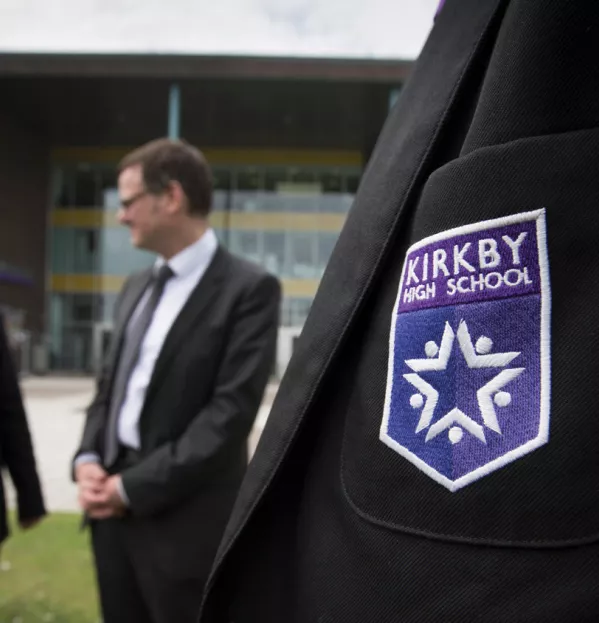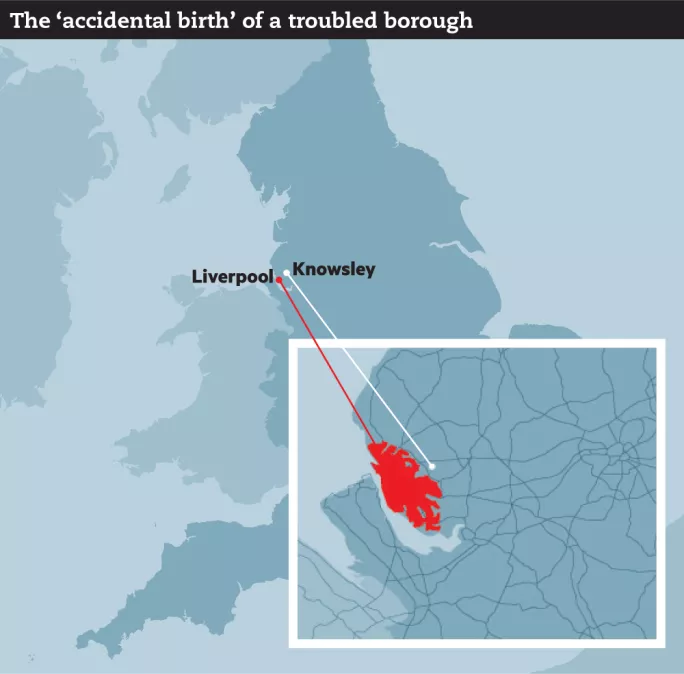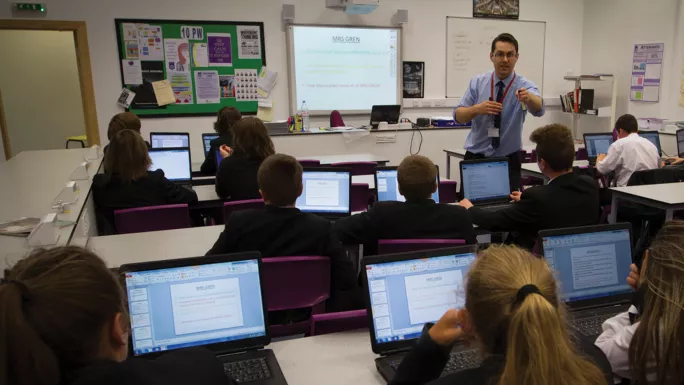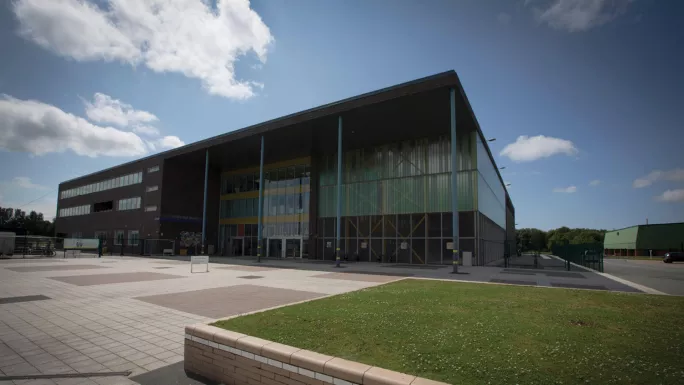How Knowsley became a case study in how not to tackle underachievement

“The kids used to call it the ‘wacky warehouse’,” Bill Leyland, head of Kirkby High School, says, gesturing at what is now a very non-wacky arrangement of classrooms.
Before Leyland took over at the Knowsley secondary, all the science and design and technology lessons were conducted in a vast, open-plan “warehouse” with no walls.
“You would have up to six groups all in there at once,” Leyland adds. “Some would be doing a science test in silence, and in the same place there was heavy machinery going: sawing, planing, hammering. Believe me, I witnessed it.”
Kirkby High’s formerly “wacky” layout is emblematic of all that was wrong with Knowsley’s secondary schools after the council embarked on a radical, but ultimately doomed, educational experiment.
And it’s why the local authority has launched a commission to help raise standards, led by former Ofsted chief inspector Christine Gilbert.

After years of stinging criticism in the press, Knowsley is now desperately trying to avoid snake-oil merchants in its efforts to help schools improve, after a decade spent flitting from one trend to the next like education’s worst fashion victim.
This eye for a bad idea peaked during the 2000s. Perennially rooted to the bottom of the GCSE league tables, the local authority grasped for an answer to its problems. Council officials gulped down the Kool-Aid and embraced the brave new world of education.
Under Steve Munby, director of education at the time, Knowsley set about a “mind-based learning” programme. With Damian Allen, his deputy and eventual successor, Munby carried out an audit of pupils’ “learning styles”, which suggested the majority were “kinaesthetic learners” who would learn best through physical activity.
Expensive experiment
The area was later lavished with £157 million of funding from the Building Schools for the Future programme. Schools were rebranded “learning centres”, classrooms were abolished in favour of open-plan “plazas” and teachers became “facilitators”.
This expensive experiment did not go well: pupils struggled to hear in lessons; the less didactic approach to teaching did not engage students as much as had been hoped; and Knowsley’s secondary schools remained glued to the bottom of performance tables.
To make matters worse, the £24-million Christ the King School in Huyton was forced to close after just two years as it failed to attract enough pupils.
Now, the borough’s remaining six secondaries are unpicking themselves from the mess that they were handed.
The borough’s six secondaries are unpicking themselves from the mess that they were handed
“It doesn’t matter if you’re a ‘kinaesthetic’, ‘audio’, ‘visual’ or whatever learner,” says Gary Evans, head of Halewood Academy. “If you can’t hear the teacher because it’s all open plan, you’re not going to learn.”
Millions more have now been spent on providing classrooms with walls, teachers are once again called teachers and the council has helped to pair two-thirds of the secondaries with successful academy trusts.

The schools have eschewed the project-based learning approach that came with a heavy reliance on vocational qualifications, and embraced a more academic - in some cases, “grammar-style” - education to better reflect the current government’s approach.
It was hoped that the latest changes would finally have the desired effect. But although it is still early days, progress has been slow - too slow for the council’s liking.
A combination of unrealistic optimism and changes to the government’s accountability measures has meant that schools’ GCSE results have come in far below predicted levels, with many between 15 and 20 percentage points out.
Knowsley’s reputation took a further hit in March this year, when it was announced that Halewood Academy would be closing its sixth form owing to low student numbers. The decision means that there will be nowhere to study for A levels in the borough.
TES understands that even the regional schools commissioner for the area, Vicky Beer, is scratching her head over what to do next. The trusts that were parachuted in have had success in turning around schools in other parts of the North West but - so far, at least - Knowsley’s secondaries have proved harder to shift than first thought.
“There is something odd, that’s what I don’t understand,” Gilbert says. “Whether they are so beleaguered…I don’t know.
“Part of the problem is that they seem to have embraced every initiative that the government has thrown at them, and whether it is because they don’t let them bed down or what, I don’t know. But one thing is for sure, the kids are no less bright than anywhere else.”
Entrenched deprivation
The biggest clue to the area’s underperformance can be found just beyond the gates of each of the gleaming new school buildings. Poverty doesn’t just punctuate Knowsley, it is spelled out in continuous, taunting prose across the borough’s buildings and towns and in the lines of people’s faces.
In Kirkby, one of the borough’s “main commercial centres”, utilitarian 1960s and 1970s buildings decay alongside a new shopping precinct. The fact that the town’s most eye-catching building is the local NHS health centre speaks volumes.
Multiple generations have never worked, existing exclusively on benefits as the region has suffered from decades of neglect. When the council talks about affluence in Knowsley, it refers to just a couple of streets.
It doesn’t matter what ‘learning style’ you are. If you can’t hear the teacher, you’re not going to learn
Knowsley may be pipped by Middlesbrough to the dubious title of most deprived local authority in England, but it is the whitest (at 98 per cent of the population) and most working-class (at 95 per cent).
In an attempt to find regions that were similarly deprived and monocultural, the council was forced to look to disadvantaged Hispanic communities in the US as a comparison, as none could be found in England.
Root of the problem
The demographics give some insight as to why this small borough, clasped to the back of the city of Liverpool, is always at the bottom of secondary school league tables.
According to Gilbert, white working-class pupils are the worst-performing group in the country and are showing no signs of improving. So what do you do when a local authority is almost entirely made up of people from that group?
“That was one of the attractions of Knowsley for everybody on the commission, because if you can get it right in Knowsley, you can get it right anywhere,” she says.
Whereas earlier attempts to improve results in the borough have concentrated mainly on secondaries, the council and its commission will look across the piece.

Previously, Knowsley’s primary schools were generally overlooked as they always appeared in the middle of league tables. Council officials believed, understandably, that the problem was less to do with primaries and more to do with aspirational parents who chose secondary schools in the surrounding boroughs. The logic went: improve the secondaries and the higher-attaining pupils won’t leave and results will go up.
But recent changes to key stage 2 tests and the introduction of new progress measures mean that primary results in the borough have collapsed.
“With primary schools, we’ve gone from mid-ranking to near the bottom,” says Paul Boyce, director of children’s services at Knowsley Council. “And although the data is questionable and all the rest of it, it’s interesting what impact just changing the way you measure things has had on our schools’ performance.”
Boyce believes that primary schools in the area, much like elsewhere in the country, have “nudged” themselves toward what gets measured in tests.
Under Boyce and councillor Gary See, the council’s cabinet member for children’s services, Knowsley is taking a far more pragmatic approach to school improvement.
The council is not trying every shiny new thing that comes along
A major victory was securing Sir Kevan Collins, chief executive of the Education Endowment Foundation, on the commission, as it hopes to embed “evidence-based” measures from preschool up to secondary.
“It means the council is not trying every shiny new thing that comes along because we don’t know what the problem is,” Boyce says. “Which is why Knowsley ended up with ‘spaceships and the internet’ in the first place.”
The borough’s latest problem is that yet another initiative with little basis in evidence could be foisted upon it, against its wishes.
After the council approached the “Red Tory” thinktank ResPublica to carry out a policy review, the subsequent report recommended that “white working-class” areas, like Knowsley, would benefit from a new grammar school in line with the government’s proposals.
Boyce and other council members have voiced their opposition to the report, stating that they “fundamentally disagree” with grammar schools. But the hare is already racing as, during Prime Minister’s Questions last month, Theresa May used the report to suggest there was support from Labour councils for her controversial policy.
The trouble with selection
It is, perhaps, symbolic that even when Knowsley tries to do the “right” thing by the borough’s schools, things do not turn out as it might have wished.
TES spoke to five of the six secondary schools, and all were vehemently opposed to the introduction of a grammar. Even Prescot School - which renamed itself in a nod to when it was established as a grammar school in 1544 - is against the idea.
Previously known as the “Knowsley Park Centre for Learning serving Prescot, Whiston and the wider community - a specialist language college”, Prescot believes it can provide a grammar-style education “without being selective”.
“You have to wonder what will happen to the ones who don’t get into the grammar school,” says Heather Mullaney, executive principal of the Heath Teaching School, a successful multi-academy trust based in nearby Runcorn, Cheshire, which sponsors Prescot.
“If you’re aspirational but your child fails the entrance exam, you’re going to the secondary modern,” Mullaney adds. “I know they’re saying it won’t be a secondary modern, but in every other part of the country where there is a grammar that’s what they are. Parents will just leave the borough. So it all goes back to the question - what is education really for?”
TES contacted Steve Munby and Damian Allen. Both declined to comment on the record.
You need a Tes subscription to read this article
Subscribe now to read this article and get other subscriber-only content:
- Unlimited access to all Tes magazine content
- Exclusive subscriber-only stories
- Award-winning email newsletters
Already a subscriber? Log in
You need a subscription to read this article
Subscribe now to read this article and get other subscriber-only content, including:
- Unlimited access to all Tes magazine content
- Exclusive subscriber-only stories
- Award-winning email newsletters